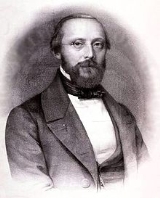
Rudolf Virchow
Overview
Medicine
Medicine is the science and art of healing. It encompasses a variety of health care practices evolved to maintain and restore health by the prevention and treatment of illness....
, anthropologist
Anthropology
Anthropology is the study of humanity. It has origins in the humanities, the natural sciences, and the social sciences. The term "anthropology" is from the Greek anthrōpos , "man", understood to mean mankind or humanity, and -logia , "discourse" or "study", and was first used in 1501 by German...
, pathologist
Pathology
Pathology is the precise study and diagnosis of disease. The word pathology is from Ancient Greek , pathos, "feeling, suffering"; and , -logia, "the study of". Pathologization, to pathologize, refers to the process of defining a condition or behavior as pathological, e.g. pathological gambling....
, prehistorian, biologist
Biologist
A biologist is a scientist devoted to and producing results in biology through the study of life. Typically biologists study organisms and their relationship to their environment. Biologists involved in basic research attempt to discover underlying mechanisms that govern how organisms work...
and politician
Politician
A politician, political leader, or political figure is an individual who is involved in influencing public policy and decision making...
, known for his advancement of public health
Public health
Public health is "the science and art of preventing disease, prolonging life and promoting health through the organized efforts and informed choices of society, organizations, public and private, communities and individuals" . It is concerned with threats to health based on population health...
. Referred to as "the father of modern pathology," he is considered one of the founders of social medicine
Social medicine
The field of social medicine seeks to:# understand how social and economic conditions impact health, disease and the practice of medicine and# foster conditions in which this understanding can lead to a healthier society....
.
From a farming family, he studied medicine and chemistry in Berlin at the Prussian Military Academy from 1839 to 1843 on a scholarship. When he graduated in 1843, he went to serve as Robert Froriep
Robert Froriep
Robert Friedrich Froriep was a German anatomist who was a native of Jena. He was the father of anatomist August von Froriep ....
's assistant at the Charité
Charité
The Charité - Universitätsmedizin Berlin is the medical school for both the Humboldt University and the Free University of Berlin. After the merger with their fourth campus in 2003, the Charité is one of the largest university hospitals in Europe....
Hospital.
Unanswered Questions
Discussions
Quotations
Medical statistics will be our standard of measurement: we will weigh life for life and see where the dead lie thicker, among the workers or among the privileged.![]()
1848 (quoted in Infections and Inequalities by Paul Farmer, page 1
Omnis cellula e cellula![]()
Every cell from a cell

